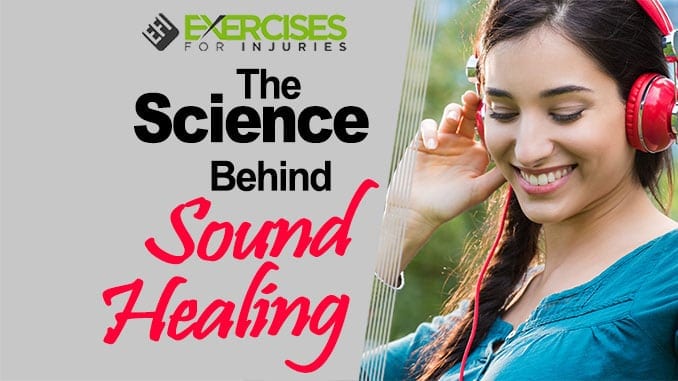
The practice of using sound and music for healing purposes goes back centuries. Today, some practitioners refer to this activity as “sound healing.” What is the science behind sound healing? Is it true that the sound of a gong or tuning fork can make you healthier? Let’s take a closer look.
Centuries-old Practice
Evidence of using sound, music, drums and chants to treat illness goes far back to cultures such as the ancient Egyptians, Chinese, Greeks and the indigenous people of Australia. Even the Bible mentions how David’s harp playing soothed the troubled mind of King Saul. The use of music and sound are evident in every culture and religion.
During World War I and World War II, Veterans Administration hospitals used music as a way to help soldiers deal with traumatic war stress and injuries. Veterans were encouraged to engage in music activities that focused on relieving pain perception. Health care practitioners recorded the positive effect music had on people’s psychological, physiological, cognitive and emotional health.
What Is Sound Therapy?
There is no single definition; however, sound therapy typically uses therapeutic sound techniques to improve physiologic, neurologic and psychologic well-being. One of the problems with attempting to define sound therapy is that sounds are incredibly diverse. For instance, some sound therapists use specific instruments such as gongs, singing bowls, tuning forks and didgeridoos. Meanwhile, other practitioners may use classical music or even singing to help treat people.
Some sound therapy sessions involve people lying on floor mats or beds while the sound therapist plays different instruments. This might be done at a distance or over specific body parts. Many people say they feel at peace and relaxed while others even speak of having a sort of out-of-body experience. Some techniques might also have you play instruments or even using your own voice as part of the therapy.
This wide variety makes scientific evaluation very difficult. Some practitioners claim that certain vibrations and notes interact naturally with the body to cause actual physical changes. While no solid scientific evidence has proven this on a biological level, many people say that they feel better after undergoing the science behind sound healing.
Why Sound Therapy Works
One of the greatest problems in the modern world is stress. Chronic stress can lead to elevated levels of stress hormones, increasing the risk of heart disease, high blood pressure, Alzheimer’s disease, anxiety, and depression. By decreasing stress levels through sound or music therapy, one might decrease the stress hormones that can cause disease. For instance, many cancer treatment clinics implement The Science Behind Sound Healing to help patients deal with the pain and discomfort associated with treatment. However, there have been no studies conclusively showing that The Science Behind Sound Healing can prevent or heal cancer, and no reliable scientific studies prove that it can heal any physical illness. Nonetheless, if the treatment helps relieve stress, some real benefits may occur.
Music is even used during surgical operations before, during and after surgery. Research shows that listening to music during all three stages helps improve surgical outcomes. Overall, patients who listened to music had less anxiety, required less sedation, recovered more quickly and reported better satisfaction with the surgical experience. The researchers also recommend that each patient should be given a choice about the type of music they listen to.
Is There a Difference?
It’s no mystery that sound can be relaxing. Who doesn’t like to sit back and enjoy music, birds singing or the sound of waves gently crashing onto the beach? The real challenge, however, is determining if certain techniques work more effectively than others. For example, if you participate in a sound therapy session with gongs and singing bowls, is this any better than listening to a Mozart symphony or a rock band?
There have been no conclusive studies that show one technique is superior to another. Some of the benefits might be due to the vibrational properties of live sound. One interesting study looked at 35 preterm infants in a neonatal care unit. Each infant received a different intervention for three consecutive days — live lullabies, recorded lullabies and no-music sessions. The results showed that live singing reduced heart rates more than recorded music. The no-music group showed no changes in heart rate at all.
A Word of Caution
Since music, sound and spirituality are sometimes closely intertwined, some sound therapy might be linked to a spiritual practice. In fact, this is often intentional as some practitioners claim that sound therapy helps you to get in contact with your soul or deep inner self. Now, one thing is to listen to sounds or music to help you relax. However, dealing with deep spiritual or emotional issues is an entirely different kind of treatment.
There have even been some studies revealing a potential danger to meditation and mindfulness practices. Because there is no uniformity or regulation around these techniques, it’s hard to know how much harm or benefit exists. Plus, a conflict between spiritual traditions may lead to social or emotional challenges that may end up increasing your stress levels.
Final Advice
The world of sound and music is full of beauty and real health benefits. We don’t need scientific studies to tell us that music makes us feel good. Do you need someone who specializes in sound or music therapy to receive the benefits of sound? Not necessarily, but having a professional accompany you might help you stay consistent. Still, be careful if the practitioner also incorporates spiritual techniques in the treatment.
In any case, even just taking a few minutes out of your day to sit back and listen to your favorite music is sure to do you a lot of good. So tune in and relax!
For your guide to the best foods to heal your body, check out The Best Foods that Rapidly Slim & Heal in 7 Days, here!




